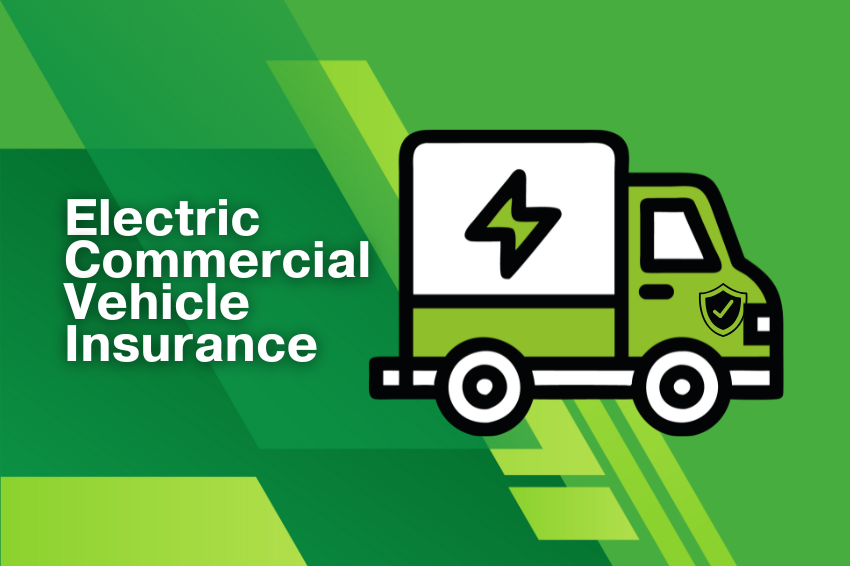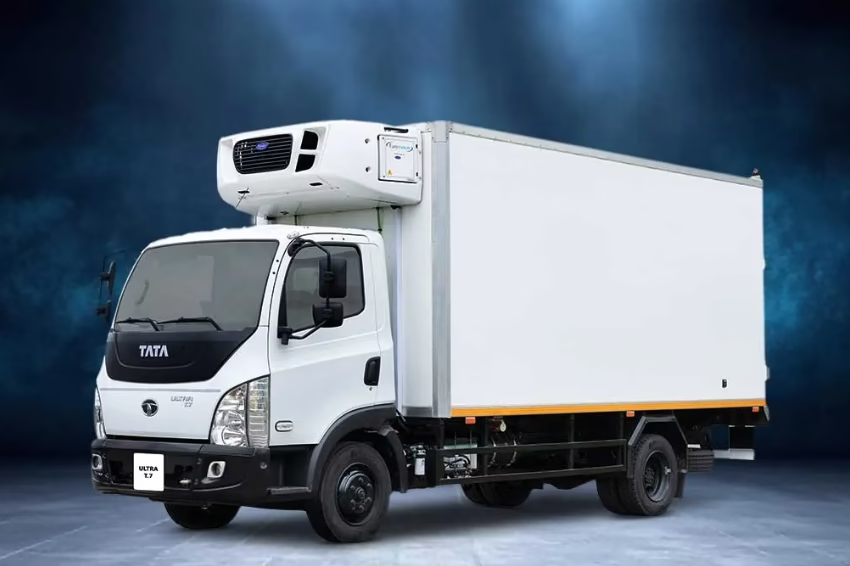The current modern world experiences a transition from gasoline-powered vehicles toward electric commercial transportation systems and vehicles. Various factors including environmental awareness growth and governmental backing of green energy and technological progress cause this transition. Organizations adopting electric commercial vehicles must understand the importance of electric commercial vehicle insurance coverage due to its increasing adoption in the market.

In this article, let’s explore complete information about electric commercial vehicle insurance by explaining coverage details and policy selection factors and advantages of insurance.
What is Electric Commercial Vehicle Insurance?
The insurance plan known as Electric Commercial Vehicle Insurance serves to protect business-oriented electric-powered vehicles within its policy scope. This insurance protects your investment against all types of risks which include accidents together with theft alongside fire incidents and damage to third parties and battery damages.
ECV insurance overlaps with traditional commercial vehicle insurance yet specifically accounts for distinct electric vehicle attributes and operational mechanics to deliver complete coverage which satisfies current standards and actual requirements.
The Essentials of Electric Commercial Vehicle Insurance
Electric commercial vehicle insurance is for vehicles that are electrically powered for business use with special features that are provided for in the policy’s coverage. However, it has features that adopt those of normal vehicle insurance with additional features unique to ECVs.
Coverage Types
- Third Party Risk: This offers indemnity for legal losses for bodily harm or property damage via a car or car being in a particular place. This is a staple product of all commercial vehicle insurance policy.
- Comprehensive Coverage: The policy provides defense against damages unrelated to accidents such as theft incidents and natural catastrophes as well as vandalism. Insurance coverage for ECVs extends to defense of high-voltage battery systems as well as electronic equipment.
- Collision: It protects the car against harm that occurs from an accident with another car or an object. This is especially so in the case of ECVs because the price of advanced electric parts that are likely to be replaced from time to time is quite steep.
- Cargo Cover: This is an important cover especially for vehicles used in the transportation of goods where the goods are covered in case, they are damaged or lost during transit.
- Equipment Breakdown Insurance: It covers the sudden breakdown of mechanical and electrical items which is of importance to ECVs due to their dependence on electrical facilities.
- Cleanup and Remediation: Concerns costs associated with pollution and damage of the environment which is something that electric vehicle batteries pose.
What is Covered in Electric Commercial Vehicle Insurance?
Electronic vehicle insurance provides safeguarding coverage which extends across multiple possible incidents. The standard policies within an electric commercial vehicle insurance provide the following coverage:
| Coverage Type | What it Includes |
|---|---|
| Accidental Damage | Covers repair or replacement costs in case the vehicle is damaged in an accident. |
| Theft | Offers financial protection in case the electric vehicle is stolen. |
| Fire Damage | Covers loss or damage caused by fire, short circuits, or engine overheating. |
| Natural Disasters | Protection against damage from floods, earthquakes, storms, and other calamities. |
| Third-Party Liability | Covers any property damage or injury caused to others by your vehicle. |
| Personal Accident Cover | Offers financial support in case the driver is injured or loses their life in an accident. |
| Towing Damage | Covers damage caused by your vehicle while towing another vehicle. |
Unique Considerations for Electric Commercial Vehicle Insurance
- Battery and Component Costs: Battery and other high voltage systems used in ECVs may be expensive when they are damaged and require replacement or repair. For these components to be given enough coverage, their policies should be clear.
- Charging Facilities: Insurance may cover faults concerning the charging facilities like chargers or electrical equipment in business entity premises.
- Technological Vulnerabilities: Usually, ECVs contain one or several innovative technologies that make ECVs vulnerable to technological risks such as cyber risks. But cyber risk liability coverage is now being provided by insurers to help combat these risks.
- Resale Value: Improvement in technology leads to high chances of low resale value of electric vehicles, in particular the older models. For some policies, companies provide coverage to loss of value of the car due to technological obsolescence.
- Compliance issues: Electric vehicle regulation has already been a problem of concern when it comes to its legal integration. Sometimes insurance providers may also provide consultations or services to enable organizations to avoid such non-compliance cases.
Benefits of Electric Commercial Vehicle Insurance
- Financial Risk: As evident from the description above, businesses are safeguarded financially from any sort of risk be it a mere accident or even theft or any environmental harm.
- Business Continuity: Insurance enables firms to reduce threats of sharpies financial losses hence continuing with ordinary business operations without a lot of interference.
- Flexibility: Company’s all those policies can be made to fit according to the business’s requirements in order to guide its employees concerning legislative use of ECVs.
- Technology Implementation: The insurance firms may provide support towards the shift to the adoption of the electric vehicles for instance by providing recommendations that advance knowledge on maintenance and charging networks.
- Environmental Sustainability: The act of insuring ECVs is evidence of the commitment of the business in environmental concerns and minimizing CO2 emissions.
What to Look for in an EV Insurance Policy?
Business continuity alongside peace of mind depends greatly on the selection of the right insurance plan that meets your electric vehicle requirements. The following points demonstrate essential knowledge about electric commercial vehicle insurance:
- Battery and Motor Coverage: The battery unit represents the most expensive component of every electric vehicle. Your coverage must protect you from both property damage and performance breakdowns when you purchase an electric commercial vehicle insurance policy.
- Third-Party and Own Damage Cover: Your essential vehicle coverage needs to include two key aspects which are third-party damage protection together with personal vehicle protection. If your vehicle damages either its occupants or other vehicles or sustains accidental damage your insurance will provide coverage in these situations.
- Add-Ons for Extra Protection: Choose add-on coverage which matches your business operational requirements by getting coverage for battery charging equipment and roadside help and zero-depreciation protection benefits. Owners of taxi services should invest in dedicated taxi insurance add-ons for enhanced protection which applies to passenger situations and frequent operation and additional mileage coverage.
- Cashless Network Garages: Ensure the insurer has a good number of garages or service centers in its network. This can speed up and smooth down repairs.
- Easy Claim Process: Choose a company that offers a simple and quick claims process. Some insurers even provide app-based claims, which can save time and effort.
Documents Required for EV Insurance
You can achieve a quick and effortless insurance buying process for your electric commercial vehicle by having proper documents during the purchase or renewal step. Here’s what you’ll typically need:
- Vehicle Registration Certificate (RC).
- Original purchase invoice of the vehicle.
- A valid driving license.
- Identity and address proof of the owner.
- Previous insurance policy details (if renewing).
- Fitness certificate for commercial vehicles.
Documents help insurance companies validate vehicle information as a way to provide commercial vehicle insurance promptly and efficiently. Save duplicate documents that can be used for both standard applications online and paper-based applications.
Tips for a Smooth Insurance Experience
The following advice will help you experience an uneventful insurance process:
- Compare Policies: Customers should obtain quotes from various insurers before making their purchase decision. You should focus on the policy contents rather than just prices when making a decision.
- Read the Policy Wordings: Review the policy wording to comprehend both covered and excluded terms. Investigate the specifications related to battery components included in insurance policies.
- Keep Documents Handy: At the time of claiming benefits submit your documents immediately because delays appear only when submissions are untimely.
- Renew on Time: The policy must be renewed before it expires to avoid lapsing. Renewing your insurance policy on time stops you from facing expensive legal issues and financial problems.
Conclusion
Electric commercial vehicle insurance is something that must be looked at for those companies who are in the process of embracing the use of electric commercial vehicles. It provides the guarantees, it keeps the business operations going smoothly, and it complies with the principles of environmentalism.
By understanding special features of ECV insurance people can acquire needed insurance contracts for different business requirements. To succeed in this business effectively people must maintain contemporary knowledge about modern trends along with their specific impact on electric vehicles.
Frequently Asked Questions (FAQs)
Is Electric Commercial Vehicle Insurance mandatory?
Yes. Insuring an ECV remains mandatory for businesses that operate vehicles since this requirement exists for conventional commercial vehicles.
Does insurance cover battery replacement?
Any damage that occurs from these specific events qualifies for insurance coverage but normal battery wear and tear does not. Insurers do not provide coverage for regular battery aging deterioration.
How is ECV insurance different from traditional vehicle insurance?
The policy extends protection to battery units alongside electric motors together with advanced diagnostic systems because these elements do not exist in traditional automotive vehicles.
Are there government incentives for insuring electric commercial vehicles?
In some regions, yes. Governments implement subsidy programs together with tax incentives to boost green technology use which includes premium reductions.
Can I transfer existing insurance to a new electric vehicle?
An insurance transfer may occur but insurers must conduct a separate assessment for electric vehicles because their coverage rates do not match those of conventional vehicles.






